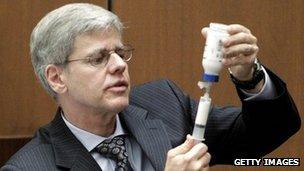Michael Jackson 'could not have self-administered drug'
- Published
Dr Steven Shafer: ''The possibility of a direct self-injection seems extremely unlikely''
Michael Jackson was so heavily sedated shortly before he died that he could not have self-administered an additional, lethal dose of the sedative propofol, a medical expert has said.
Dr Steven Shafer was testifying at the involuntary manslaughter trial of the singer's physician, Dr Conrad Murray.
Dr Shafer dismissed the idea the star could have drugged himself - an early argument put forward by the defence - as "crazy".
Dr Murray denies the charges.
Dr Shafer also suggested Dr Murray gave Jackson larger doses of the powerful sedative than he told the police.
The expert, who helped write the guidance printed on every bottle of propofol, walked the jury through a number of possible scenarios in the hours leading up to Jackson's death during his testimony on Thursday.
The Columbia University professor said it was most likely that the star was on an IV propofol drip when he stopped breathing, but that Dr Conrad Murray was out of the room.
The propofol kept flowing as the star's lungs emptied and even after he was dead, Dr Shafer told the jury.
He also suggested Dr Murray gave Jackson 100ml of propofol, a larger amount than the 25ml Dr Murray claims he administered.
"This fits all of the data in this case and I am not aware of a single piece of data that is inconsistent with this explanation," Dr Shafer told the court.
'Pharmacological never-never land'

Dr Shafer said the amount of lorazepam in Jackson's system was 'trivial'
Dr Shafer testified on Wednesday that the drug should never be used to treat insomnia and Dr Conrad Murray's negligence was directly responsible for Jackson's death.
"We are in pharmacological never-never land here, something that was done to Michael Jackson and no one else in history to my knowledge," he told the jury.
He said of Dr Murray's delay in calling 911: "I almost don't know what to say. That is so completely and utterly inexcusable."
The expert in anaesthesiology added Dr Murray should have refused the star's requests for propofol.
"Saying 'yes' is not what doctors do," said Dr Shafer. "A competent doctor would know you do not do this."
Dr Shafer also testified that Dr Murray should have taken minute-by-minute notes of Jackson's condition while he was under the influence of propofol.
The anaesthesiology expert added that doctors should never multi-task while monitoring a sedated patient.
"A patient who is about to die does not look all that different from a patient who is OK," he said.
Dr Shafer is the prosecution's final witness, on Friday the defence is due to lay out their case.
If convicted, Dr Murray could spend up to four years in prison and lose his licence to practice medicine.
- Published13 October 2011
- Published12 October 2011
- Published12 October 2011